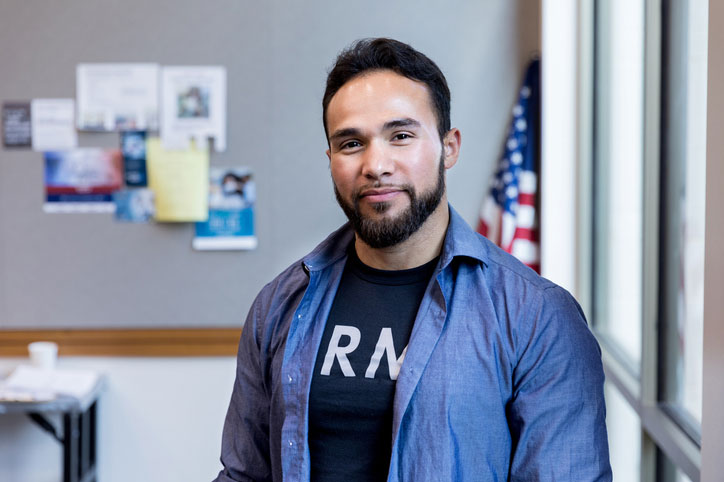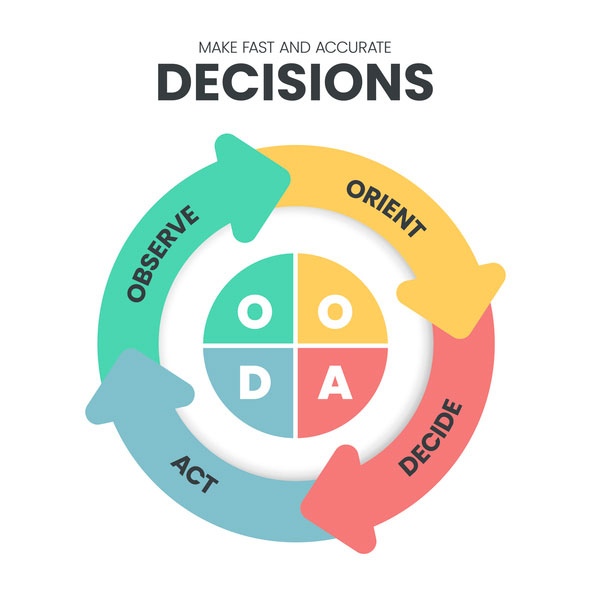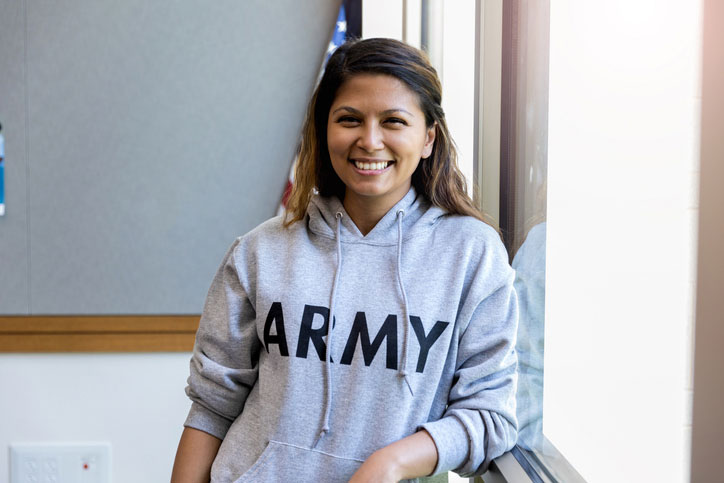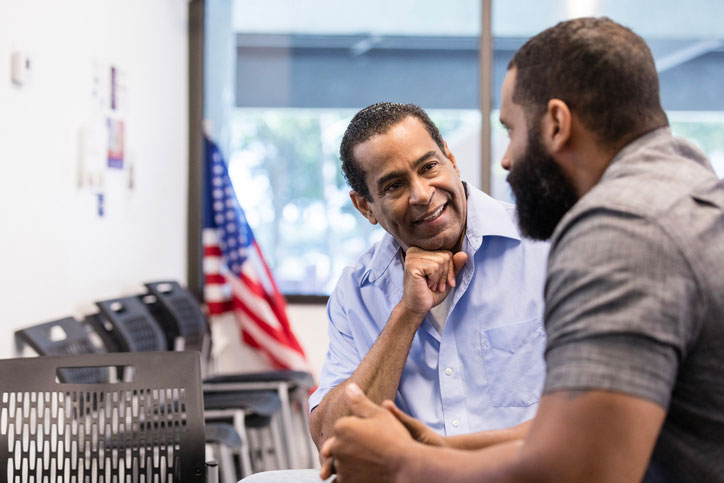Reviewed by Ashley (Brendle) Rey, MBA

After separating from the service, some 1.8 million veterans have found themselves permanently at anchor around the Golden State.
That’s the most of any state in the Union, according to 2024 data from the Census Bureau.
Unlike the ghost fleet in Suisun Bay, vets are an active and vital part of a thriving economy. There are around 250,000 veteran-owned businesses in California, some 7 percent of all firms in the state. Vets are an economic powerhouse for the state, not only founding and operating successful businesses, but also serving as managers and executives at both small businesses and for many large and publicly owned enterprises.
With their proven commitment to public service, you’ll also find veterans exercising their management skills at every level of state government in California.
Yet the transition from stout defender of American freedom to thriving capitalist icon isn’t automatic or immediate. Military service offers many key life skills that apply to the world of business. But it doesn’t drill down into many other important factors like accounting, marketing, or technology.
A master’s degree in business, however, can fill in those gaps and launch you toward success in the civilian world.
Military Service Lines Right Up with the MBA Ethos
Like everything you learned in the military, business management is a skill that can be taught. And like the relentless and comprehensive course catalog of TRADOC (Training and Documentation Command) that puts a half a million soldiers through some 1,400 types of courses every year, there are dedicated business schools you can trust to teach it right.
Front and center among advanced business education programs is the Master of Business Administration (MBA).
The MBA has become a touchstone for future executives, entrepreneurs, and senior managers in every kind of American business. It’s typically a two-year course of study that takes in all the critical elements of running a business:
- Management techniques
- Finance and accounting concepts
- Marketing theory and use
- Leadership development
The nature of the programs are such that they boost career prospects through a combination of peer and industry networking and specific instruction in career-advancement like resume building, self-promotion, and interviewing techniques.
California is known around the world for top-flight business schools, featuring more than 80 MBA programs offered at public and private universities, from the north to the south.
Among them are some of the most elite business schools in the world, turning out future Fortune 500 leaders and startup founders who change the face of business. But there are also many extraordinary business schools here that are perfectly accessible to former soldiers, sailors, and officers without six-figures to spend looking to get a boost in job prospects after discharge. That’s not to say you can’t get into Stanford or Pepperdine if you’re feeling rich, but the point is you don’t have to.
How an MBA Complements Military Training to Produce Strong Leaders for California Businesses
Discipline, commitment, dedication, integrity… it’s not hard to see how American military values can make a splash in the ranks of corporate leadership.
These are something that business wonks call the intangibles… character-driven value that doesn’t show up on standardized tests or in a dry catalog of job responsibilities on a resume. American vets have those intangibles in spades.
What they are missing are some of the nuts and bolts of business management. Accounting skills, HR requirements, branding and marketing strategies, and regulatory standards aren’t things you pick up in Basic or even in OCS.
An MBA fills in those gaps. With the right kind of curriculum, it’s a complementary education that can give vets a tremendous advantage not only over other job candidates, but even over other MBA graduates.
Hernán Luis y Prado, Founder of Workshops for Warriors, Proves Great Things Happen When Business and a Tradition of Service Intersect
 It’s not easy to rise from the enlisted ranks to become an officer in any branch of the service. It’s even less easy when you were born in Argentina and raised in France and joined the military on the same day you gained your American citizenship.
It’s not easy to rise from the enlisted ranks to become an officer in any branch of the service. It’s even less easy when you were born in Argentina and raised in France and joined the military on the same day you gained your American citizenship.
Hernán Luis y Prado did all those things. Enlisting in the Navy as a Hospital Corpsman, he did three tours in Afghanistan and Iraq before becoming an officer and attending the Navy’s Surface Warfare Officer School and completing the Chief Engineering Officer and Combat Systems Officer courses. Stationed in Washington D.C., Luis y Prado was on track to become a doctor… and then he ran into an injured vet he had served with in Iraq and decided to take an entirely different path.
In 2009, Luis y Prado founded VetPowered in San Diego. Handling rapid prototyping and CNC manufacturing, maintenance, and custom fabrication, it’s a thriving 24-building hub in Barrio Logan that fuels an even more important mission: the Workshops for Warriors program, a training opportunity for vets seeking careers in advanced manufacturing.
For his services and dedication to helping fellow vets, Luis y Prado has received recognition from the White House and the California State Legislature. But the business world has also hung a few medals on Luis y Prado’s lapel, with the Small Business Administration for the state of California naming him Small Business Person of the Year and the San Diego Business Journal recognizing him as CEO of the Year. Receiving decorations long after a military career is over stands as a strong testament to what happens when you put business and service together. But Luis y Prado will tell you that the success of the vets coming through the Workshops for Warriors program is the only thanks he needs.
Getting Inside the Business OODA Loop on Active Duty in California

But the OODA loop is a big deal in modern B-schools, too.
The team that is decisive in taking action first has the initiative; they are running the engagement.
That’s true for your business career, too. If you decide early in your military career that business management is in your future, you have the initiative to take advantage of many opportunities to prepare your skillset while still on active duty—and on the military’s dime.
Getting Assigned to a Business-Oriented Billet on a California Military Base
Some of the most important of those opportunities have everything to do with your specialty and billet. The daily activities you perform on duty are what build your expertise through your military career, and can also benefit you in your civilian career. The closer they align with the demands of business, the better prepared you will be to dominate in an MBA program.
The intangibles that come to every American soldier, sailor, Marine, airman, or Coast Guard member in California are unquestionably beneficial in the business world. But there are some roles in the service that have a more business-oriented skillset than others… and that come with the kind of routine training that reinforces that skillset.
These will come through Military Occupational Specialty (MOS) and ratings including:
- Finance and Comptroller
- Logistics Specialists
- Personnel Specialists
- Acquisition Branch
- Supply Chain Material Management
- Storekeeper
- Yeoman
California, with the heaviest military footprint of any state, is a goldmine for these assignments. The state hosts 123 bases, scattered around on big coastal installations like Camp Pendleton to remote Edwards Air Force Base to tiny little Sierra Army Depot way out on the Nevada border. That’s more than double the number of any other state, and our location on the West Coast means that many of them are logistics-focused to support forward deployments across the Pacific Rim.
That makes for more than our fair share of supply, maintenance, transport, and overhead billets. And they can be easy to land, since the state is home to more active duty troops than anywhere else in the country, pushing up close to 160,000 airmen, sailors, soldiers, and Marines. Plenty of personnel will rotate through Cali at some point in their service—one of them might be you, landing in a key position that boosts your basic business skills.
All Service Members Have Education Options, but Officers Have the Best Picks for MBA Prep
All of them have access to both built-in training and duty assignments that come with certain billets, and also educational supports that are available to active duty service members on a number of levels.
In some cases, that training may even be applied to civilian college credits through programs such as the College Level Examination Program (CLEP) or DANTES Subject Standardized Tests (DSST).
Other opportunities, like COOL, Credentialing Opportunities Online, will foot the bill for you to take certain professional or industry certifications that are relevant to your billet.
The best preparation for post-service business studies and careers comes through service as a commissioned officer.
Any officer is going to have an automatic leg up in both earning admission to an MBA program and to building skills in the military that apply to the business world. Of course, officers must already have a bachelor’s degree to earn their commission, so they are already halfway to qualifying for an MBA. But they also have more integral training in business skills, and more opportunities for formal business education while still in the service.
Veterans who held commissions in any branch of the military are highly sought after in the American business world. Carol Dedrich, CEO of Girl Scouts San Diego, got her start as a Patriot Missile Officer during Desert Storm before earning her MBA. California Bank and Trust’s VP and Business Center Manager Gilbert Kennedy was in Naval Special Warfare operations before switching to the private sector. FinDec, a financial planning and wealth management firm in Stockton, turned to Michael Lee, a one-time major in the military police, for leadership as President and CEO.
The leadership skills, ability to make decisions under pressure, and discipline that is part of the officer training exemplifies the ideal senior business executive.
Officers get HR experience in pretty much every assignment. They sign off on unit records, keep logs, and interpret regulations.
Corporations can pick up those qualities for free when they hire a former officer, and they know it.
Taking Advantage of Active Duty Benefits and Scholarships to Earn College Credits Toward a Business Degree

Whether officer or enlisted, though, active duty service members in California can take advantage of both branch-specific and DoD (Department of Defense) programs that allow you to take college classes of your own choosing.
The Military Tuition Assistance program is one of the most universal of these, offering slightly different benefits based on the armed services branch you are in. Generally, you can expect financial coverage up to $250 per semester hour for up to 130 semester hours of undergraduate study or 39 semester hours of master’s-level courses. You can take up to 16 credits per year, but only on your own time.
There are also certain scholarship opportunities only available to active duty personnel, such as those offered by non-profits according to branch:
Your Service Can Include Orders to Earn an MBA at a California College
The ultimate benefit, of course, is to get the military to pay for your MBA while you’re still in the service.
This is mostly only an option for officers, and only for a few. But if the stars align and you are assigned to a billet requiring a graduate degree, you could end up at a California MBA program via branch-specific programs:
These keep you on active duty, with full pay and benefits, plus covering all tuition, expenses, room and board at your school. You’ll have some choices over what school that is, but it will have to fit certain service-related requirements. The good news is that the quality and range of California universities offering MBAs, it shouldn’t be tough to land one as an option.
Exploring Education and Transition Benefits Open to California Service Members During Discharge

The reality is that not every service member who is angling for an MBA will have a shot at those active duty billets or training schools, however.
One thing that absolutely every single one enjoys, though, is the mandatory Transition Assistance Program (TAP) put in place to support service members in every branch through discharge and into their transition back to the civilian world.
TAP starts a full year ahead of your anticipated separation date. It comes with counseling, career guidance, and a cornucopia of resources that include everything mentioned on this page and more. It involves guidance and resources from five different government agencies, including a few that are of special interest to business majors:
- Department of Labor - Instruction in interviewing techniques and resume building
- Department of Education - Providing financial aid and overview of college application processes and keys to higher education success
- Small Business Administration - Offers an introduction to entrepreneurship through the Boots to Business module
Primarily, TAP is about getting you thinking ahead to your post-service plans and identifying a battle plan for life and business outside the big green machine.
Transition Assistance Comes with a Free Business Primer

Boots to Business is the SBA (Small Business Administration) contribution to TAP. It comes with an overview of business ownership and the startup process with a two-day in-person course that highlights:
- Legal considerations
- Economics of small business startup
- Recognizing business opportunities
- Financing options
- Business planning skills
- Market research
Those are all invaluable groundwork to prepare for MBA studies, but there’s more. An optional set of online follow-up courses explore business models, customer services, and more advanced business planning.
While not every MBA will become an entrepreneur, this is still amazing free instruction in all the essential elements of business management that good executives must master.
The Skillbridge Program Lets You Take Part in a Business Internship While Still on Active Duty
Another unique opportunity when you’re on your way out the door from active duty is the DoD Skillbridge program.
This is an option available during your final 180 days of service, with the approval of command. It connects you with training, apprenticeships, or internships with civilian industry partners, of which there are more than 700 in California alone.
These run from e-commerce companies to consulting operations, with roles that include business analysis, finance, and technology management. It’s a great way to build actual business experience while you are still in the service, and that is a great way to impress MBA admissions officers at any California university.
G.I. Bill® Education Benefits Offer the Most Significant Support for Veterans in California MBA Programs

The reality, of course, is that most service members won’t actively begin their business degrees until after discharge. That means the most obvious path to a degree will come through the G.I. Bill®.
Available to any service member with an honorable discharge and service that occurred after September 10, 2001, the Post-9/11 G.I. Bill® will pay some level of tuition and fees up to full in-state tuition rates at public schools, or $28,937 at private institutions. It may also cover room and board, supplies, and even relocation assistance for some eligible vets.
There are other G.I. Bill® programs that cover those who served prior to 2001 or in the National Guard or Reserves, with different conditions and benefits.
If you served for at least 36 months, you get 100 percent of that benefit, or if you served any amount of time and were wounded in action, or if you served at least 30 continuous days but were discharged with a service-related disability. But everyone with more than 90 days active duty service will receive at least some funding.
Yellow Ribbon Helps Close the Finance Gap at Some Elite California B-Schools
Despite the generosity of the G.I. Bill®, the high price tags of top MBA schools can leave thousands of dollars on the table over and above what Uncle Sam can pay. This is the case at elite private universities, or if you are enrolled in a CSU or UC school as a non-resident.
Active duty students or those recently discharged who were stationed in California immediately prior to separation may qualify for a waiver and get resident tuition rates at state universities, making Yellow Ribbon unnecessary.
That makes the Yellow Ribbon Program a crucial part of the plan for many California vets seeking MBAs.
Yellow Ribbon is a cooperative effort between the VA and individual universities to bring those costs down for vets. Each school decides how many veterans it wants to cover under the program. Sometimes this is done on a per-department basis, so the business school may have fewer openings than the university as a whole.
If one of those slots is available, however, the school will take a look at the difference between what your current benefits will cover and their total fees and tuition. They will then apply a certain amount toward that overage, and the VA will match their contribution.
In many cases, Yellow Ribbon contributions add up to enough to pick up the full amount of tuition costs. At a minimum, it leaves you on the hook for far less than you would otherwise have to pay.
Not all schools participate in Yellow Ribbon, so you’ll want to make friends with the VA G.I. Bill® Comparison Tool. You can search by location, school name, and filter by Yellow Ribbon status. You can also see if the school has veteran’s groups and how many current students are using the G.I. Bill®.
The tool also allows you to put in your own status and calculate your benefits, as well as find school-specific tuition policies and even see if any complaints have been lodged against it.
California Military Department Programs Support National Guard Members
One group of veterans who don’t always qualify for the post-9/11 G.I. Bill® are the citizen soldiers of the California National Guard. They are often more directly involved with the defense and protection of the state, serving on the lines at wildfires like 2024’s Line Fire, during disaster responses, and to man testing and vaccination centers during the COVID-19 pandemic.
But they may never be called to Federal active duty status despite dedicating years of service to their fellow citizens—meaning they aren’t always eligible for regular G.I. Bill® benefits.
But the California Military Department’s own G.I. Bill® Award Program has you covered. You can use it while still in the Guard, although you must commit to at least two additional years of service after completing your program. It covers 100 percent of tuition at most UC or CSU schools, and up to the equivalent amount of a state Cal Grant A award at private institutions.
The Benefit No One Talks About: Vets Are More Likely to Be Accepted to Competitive MBA Programs

Vets also have some advantages in what is often the most significant concern for prospective MBA students: how to qualify to get into a top California MBA program.
Highly-ranked MBA programs are the Special Forces pipelines of the academic world. They recruit top candidates, and they produce elite results. For most students, qualifying for entry means acing their GMAT scores and coming in with an undergrad GPA of 3.5 and up. And that’s just the start… you need impressive prior experience, entrance essays that knock the socks off admissions officers, and interviews that leave them wanting more.
But vets benefit from their own sort of affirmative action in B-school admissions.
It Never Hurts to Be Seen as a Strategic Genius in Business School or Beyond
 No one who has ever been to war will make a straight-faced comparison of battle and business, at least not the way many macho executives who have never been within 10,000 miles of a combat zone often do.
No one who has ever been to war will make a straight-faced comparison of battle and business, at least not the way many macho executives who have never been within 10,000 miles of a combat zone often do.
But there’s no denying that many of the processes that the military brings to bear in strategy, logistics, and operations share common features with those used in business.
So you will no doubt run into a range of readings in your MBA studies such as “The Art of War For Managers,” “Sun Tzu For Business Success,” or “Sun Tzu and the Art of Business.”
Oddly, not a lot of formal study of Sun Tzu happens in the military itself. But your time in the service will be filled with distillations of that ancient Chinese wisdom that you will adapt to business contexts.
Maybe even more importantly, you’ll come to the business world with a built-in reputation as a sort of strategic genius. Some say it’s best to sit quietly in the back of class and nod wisely from time to time, remaining inscrutable, and intimidating professors and classmates alike.
True or not, you’ll be seen by both admissions committees and potential employers as some sort of strategic genius. At the very least, you’re probably older and more mature than many applicants, and bring the calm wisdom that comes with your military experience.
Many California business schools offer waivers for their hefty application fees for military and veteran applicants.
Also, having been through the wringer of tough military training and assignments, veterans often do well in MBA admissions interviews. You’ve been trained to be confident, prepared, and you have unique stories and perspectives that aren’t often found in the civilian world. You’re definitely not going to be showing up late or unprepared.
What this boils down to is that veterans have about a 50 percent higher MBA acceptance rate than traditional students. Better odds of acceptance with greater financial supports is a killer combination.
California Business Schools and Associations Have Your Back as a Veteran Pursuing an MBA
California veterans also have a lot of people pulling for them at various business schools themselves. Scholarships and other supports are available on a school-by-school basis throughout the state.
The Schoen Family Scholarship Program for Veterans at USC is one example, open to grad students in business with at least three years of full-time, continuous active duty service. Other schools don’t have a particular scholarship earmarked for vets, but do prioritize veterans when awarding their general merit-based scholarship funds. Several other California MBA programs participate in the Military MBA Scholarship Program.
MBV (Master of Business for Veterans): A One-Of-A-Kind California Business Master’s Geared Specifically for Vets
 One unique option for California vets isn’t an MBA at all… instead, it’s an MBV, Master of Business for Veterans, from USC’s Marshall School of Business.
One unique option for California vets isn’t an MBA at all… instead, it’s an MBV, Master of Business for Veterans, from USC’s Marshall School of Business.
As the name suggests, the MBV is aimed specifically at military vets, active duty, and reserve personnel. It is built to leverage management and leadership experience from your military service toward the demands of the business environment.
The program lasts only 10 months, but is fully accredited, sharing faculty with Marshall’s world-class faculty. It’s essentially run similarly to the school’s EMBA but drops much of the coursework on leadership and management skills that you have already absorbed in the service. Instead, it delivers additional and specific instruction on transitioning those skills to the business world.
This is a great way to take advantage of your unique skills and background, but it can also cut into the traditional value proposition of an MBA. Since you will, by definition, be part of a cohort of military vets, you’re losing out on some of the broader networking opportunities that MBA grads often count on. It’s also the case that an MBV is new and different, making it something that recruiters may not be very familiar with yet. But you could be the one to change that.
Finding Academic and Emotional Support as a Veteran MBA Candidate in California
Veterans also have unique supports available after they get their financing lined up and get accepted to the MBA program of their dreams.
Many MBA students are older than the typical grad student, so former soldiers and sailors won’t be unique in that respect, even if they took a detour through the service before replacing their rucksack with a book bag. But one of the side effects can be that your academic skills may have atrophied while you were devoting your learning skills to mastering small unit tactics and artillery azimuths.
So specific academic counseling services like the Veterans Resource Center at Cal State Fullerton can get you up to speed. They also offer advice and assistance with some of the basics of college life you may have lost your fix on, like course registration and planning.
Your Buddies Will Always Have Your Back at California B-Schools

Many schools also have active veteran student groups. They may not have a lot of resources to offer, but they do give you a tight group of comrades who understand where you are coming from and have proven they are willing to help you get where you want to go. UCLA’s Anderson Veterans Association is one example, running events like Career Night, an Alumni Mixer for networking, and offering up student ambassadors for when you just need to talk to someone who gets you.
More general support groups like Student Veterans of America also offer great resources on California campuses for veterans in MBA programs.
There are also three California colleges offering MBA programs that have a new and experimental on-site counseling service from the VA: VSOC, or VetSuccess on Campus.
A dedicated VA counselor and outreach coordinator are part of these offices, with peer-to-peer counseling and referral services available to assist with transition and support. That can smooth your path to everything from health care services to disability accommodations to plugging in to your G.I. Bill® benefits.
Easy access to these resources is a big plus for vets pursuing an MBA at:
- UCLA
- CSU Long Beach
- CSU Los Angeles
The reality is, though, that veterans are better prepared for business school, and business, than most students. While the additional support is no less than what your country owes you, the truth is that you’ve got the upper hand long before you crack open that first textbook.
